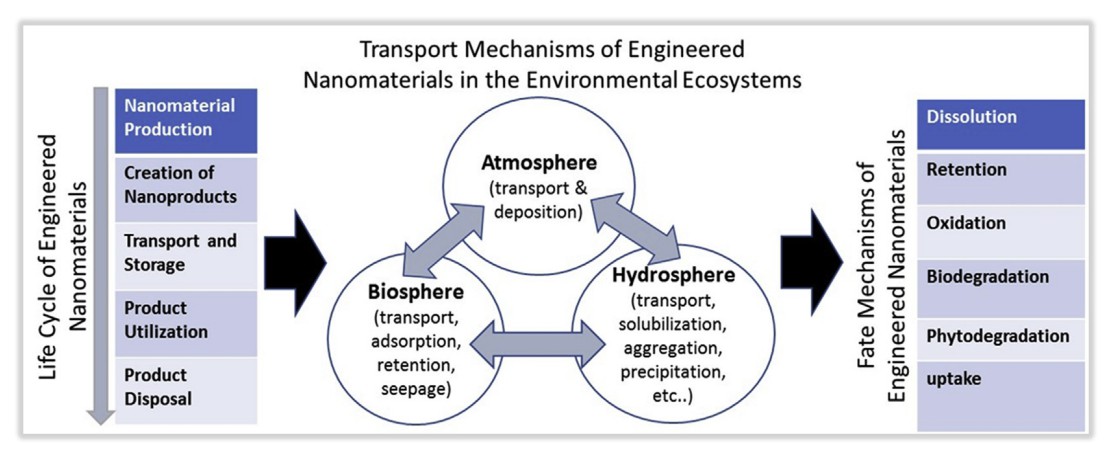Nanomaterials have a promising application in plant protection, and promoting the assessment of the safety of nanomaterials helps the application of nanomaterials in plant protection. Lifeasible helps investigate the safety of nanomaterials and provides customized safety assessments of nanomaterials.
As the applications of nanomaterials in various fields, such as plant protection and biomedicine, are expanding, the safety of nanomaterials is of increasing concern. The residues of nanomaterials in the environment, especially those of engineered nanomaterials in landfills, soil, water, and air, have become a public safety issue. The safety assessment of nanomaterials is divided into risk assessment and life-cycle assessment. Among them, life-cycle safety assessment is difficult because the dose-response relationship, risk assessment methods, and mode of action assessment have not been determined.
 Fig. 1 Potential discharge of engineered nanomaterials in their life cycle and their environmental transport and fate (Mohamed et al., 2021).
Fig. 1 Potential discharge of engineered nanomaterials in their life cycle and their environmental transport and fate (Mohamed et al., 2021).
Lifeasible offers the following safety assessment services for nanomaterials used in plant protection. We help detect residues of nanomaterials in the environment and evaluate the risk assessment of nanomaterials on plants, animals, and microorganisms. We also provide safety assessments of nanomaterials using computer technology. You can select or customize the relevant safety assessment services according to your needs.
Residue detection of nanomaterials
We help detect nanomaterials' residues in soil, water, air, plants, animals, and microorganisms. This service is the basis for assessing the safety of nanomaterials. Through residue detection, we help to further analyze the degradation rate of nanomaterials in specific environments to determine the persistence of nanomaterials in the environment.
Risk assessment of nanomaterials to living organisms
We offer services to help determine the relationship between the hazard profiles and the remaining nanomaterials in the organism. The hazard profiles we test include the disruption of the organism's vital metabolism, protein replication, nucleic acid replication, etc. We also provide in vitro safety assessment experiments to determine nanomaterials' hazards.
Computer-based safety assessment of nanomaterials
We offer to analyze the safety of nanomaterials using computer technology. We perform computer simulations of interactions between nanomaterials and other molecules and simulations of nanomaterials cycling in the environment to determine the safety of nanomaterials.
Accurate nanomaterial residue detection
We have advanced instruments for the detection of nanomaterials. We can also design simple and rapid analysis processes based on the characteristics of the nanomaterials to achieve efficient detection of residual nanomaterials.
Combining in vivo and in vitro safety tests
We offer a variety of in vivo and in vitro safety assessment assays to help test the safety of nanomaterials. For in vivo testing, we can provide inhalation toxicity tests, spray toxicity tests, and exposure toxicity tests. For in vitro safety assessment, we use high-efficiency safety assessments such as high throughput sequencing analysis, high content analysis, proteomic analysis, and cytotoxicity analysis.
Customized safety assessment using computer technology
For safety analysis of interactions between nanomaterials and other molecules, we offer the establishment of molecular dynamics models, molecular interaction models, and quantitative conformational relationship models for reaction analysis. We can also use computer technology to simulate nanomaterials cycling in the environment and help conduct safety predictions based on specific environmental factors (such as climate and pH).
Lifeasible offers safety assessment services for nanomaterials. Please contact us for a customized nanomaterials safety assessment service.
References